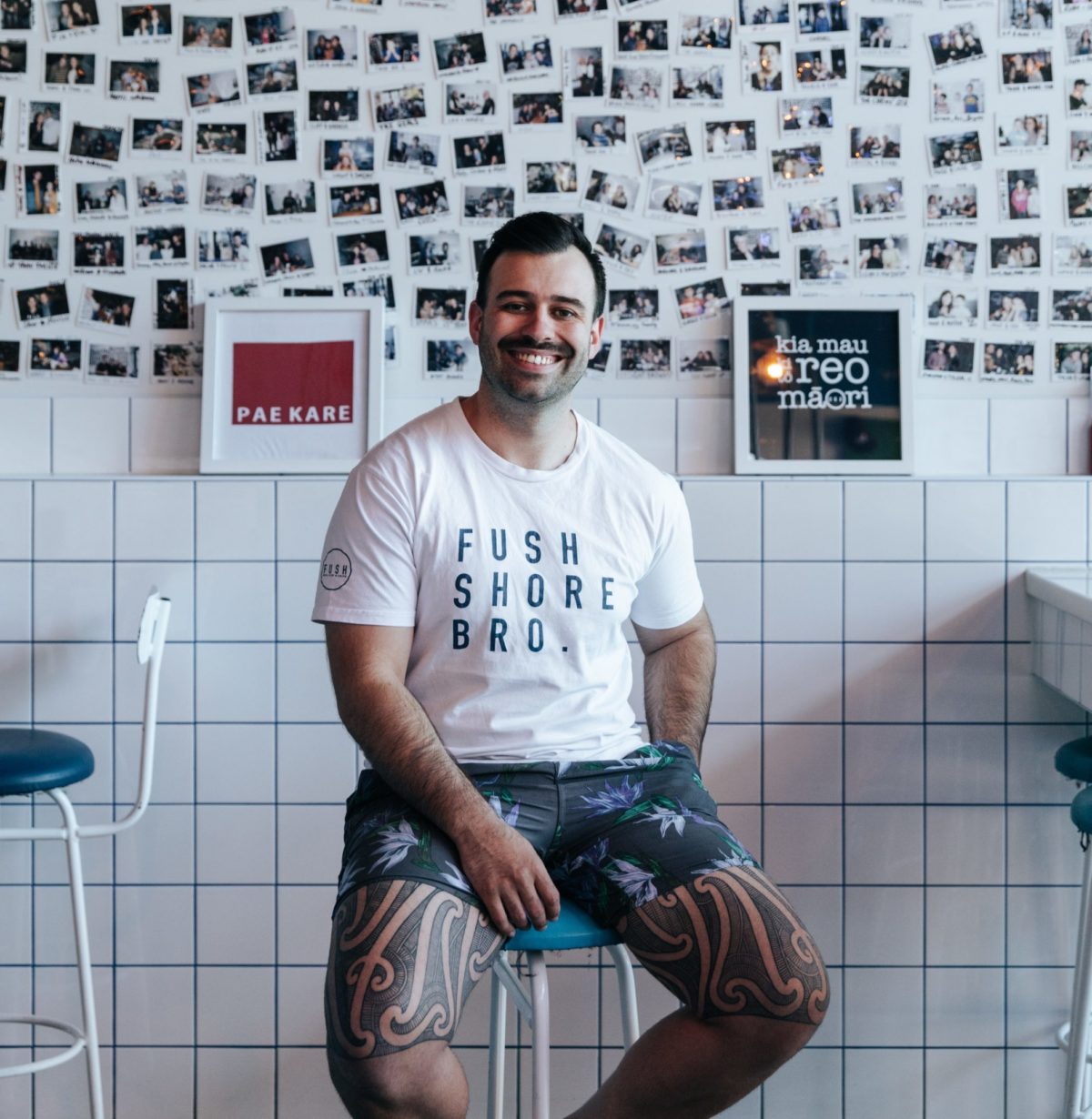Behind the business: Anton Matthews, Fush
9 Dec 2021
Every business is important to someone. So they’re all important to us.
In this series, we’re chatting to some BNZ customers and getting to know the people, and inspiration, behind the business.
Fush is a unique restaurant in Christchurch specialising in classic Kiwi fish and chips with a twist. Brother and sister, Anton and Māia Matthews, along with Anton’s wife, Jess, have built the Fush brand around normalising te reo Māori in the community to protect its use for future generations.
What is your personal business journey and the inspiration behind Fush?
In one word, the inspiration has been Manaakitanga.
Manaakitanga being, as a host, your ability to take care of and serve other people. What I’ve been taught is that through Manaakitanga, that’s how you earn mana, and mana is this currency that we all want more of, we want to hold on to it. But like currency, you can lose it, if you fail to serve people.
So, the inspiration to get into this business was, well, hey, if we can get into a space where we’re able to serve people every single day, that gives us unlimited opportunity to practice and embody Manaakitanga and if we can do that at a really, really high level and become known for it, then our mana will increase and that’s how we want our whanau to be remembered.
Do you feel that you are fulfilling what you set out to achieve with your business? Has anything changed along the way?
I think you’re always your own worst critic. So, there’s always things that I know we can do better.
People tell us that we’re doing it and that’s nice, that kind of gives you the fuel and the motivation to carry on and keep pushing forward. It’s always nice to hear when people like what you’re doing. We have a saying in te reo Māori: Waiho mā te iwi hei kōrero, which basically means ‘let the people sing your praises.’ And so, I think the people will speak for themselves and if we can grow our business, then what that tells me is that there’s enough people out there who believe in what we’re doing. If that happens, then we must be doing something right.
Have our goals changed? I suppose, they’ve just gotten bigger. For the last five years, it’s been about building the brand. It’s only now that we can start scaling up what we believe is a really special kaupapa. How can we employ, a management team rather than just me and my sister, and our finance manager? A specialist HR person, a specialist procurement manager, a specialist executive chef? How can we employ those people and build a business that has its own autonomy? Making sure we’re focusing on that future and making those opportunities for the next generation to come through.
What was that transformative moment when you knew what you were doing was great/working?
Look, we’re all self conscious and we all have our own insecurities. I’m no different, but one thing that I have always believed, is that I can do it. There have been lots and lots of times where I’ve thought, I don’t know how to do that, and I don’t even know where to go and find the answers, and that’s quite scary. But I also know it’s been done before, so all I have to do is figure it out. It’s like cracking a code.
How did you come up with the name for your company?
We wanted something that was quick, that was easy to say and that captured what it was. The new standard for the humble fish & chip shop. We thought, well, Fush is the perfect name for a New Zealand fish and chip brand. It has a real Kiwi flavour to it, and I also really love the playfulness and the way we have been able to incorporate the phrase “fush shore bro” into our business too. It just screams “born in Aotearoa” to me.
What has been your biggest challenge so far?
I think it was changing people’s perception around fish and chips. People think fish and chips is a cheap takeaway $1.50 scoop and a $2.00 fish. We couldn’t understand why a pub or restaurant could sell a $30 fish and chips meal and why we couldn’t? Especially since we were obsessed with creating the perfect plate of fish and chips.
It probably took four years for us to really change people’s minds and the way I think we did it in the end was, we’re not a fish and chip shop – well, we are, but we’re a new breed.
We didn’t want to compete on price, we wanted to separate ourselves from everyone else. It was about how we can provide value to our guests in other ways. And that’s how the idea of sharing our culture, sharing our language, our stories. Let’s provide value to our community in other ways so that people know, when I buy Fush, yeah I’m getting amazing fish and chips but I’m getting a whole bunch of other stuff as well. I’m getting the language, the culture, I’m getting all the other things that are packaged together with Fush that I can’t get anywhere else. So, it’s an experience with the brand. It’s how they feel when they engage with us.
What advice would you give any person starting their first business?
Make sure you get good advice. Surround yourself with the people that you want to aspire to be like. Identify role models and mentors and then put yourself in their circles. Because those are the people that put pressure on you in the right way. When someone’s already doing a really good job, they’re not trying to take from you. They’re there to try and help you. They’re going to force you to become better. Challenge yourself to be the least experienced in the room, with the least knowledge – that’s a good place to be because you can only go up from there.
How important are the people and relationships you build to running your business, including the one you have with BNZ?
The most important people in our company are our people, our staff. If they aren’t happy, if they’re not working at their peak performance, then it’s pretty hard to achieve anything great. So my focus has always been on them. I believe that if I do a good enough job as a leader, looking after my people, then they will turn around and they will look after all the guests that come through the doors.
And really looking after them making sure that we’re investing in them, making sure that we’re continuing to provide them with the challenges that they need to keep them excited and motivated. I want to create opportunities for my people to experience the sort of success that changes whanau for ever. I want my people to have limitless beliefs about what they can do. I want them to have an abundance mindset. I want them to become great role models for their friends and whanau, and to be proud of the legacy we are building, and the people they are becoming along the way. A big part of creating that level of success, is making sure that we surround ourselves with the right people and that includes our banking partners too.
I came to BNZ four years ago and honestly, it’s been a really positive experience and that’s not me just blowing smoke up your backside! What I recognised straight away with BNZ was that they were invested in the same sorts of things that were important to me.
The things that are important to me are my passions to normalise te reo and share my culture. When I’m speaking to any person at BNZ, they know who they’re speaking to because they use ‘kia ora’ and they use Māori phrases as much as possible, and that sort of stuff goes a long way with me. It’s a personalised experience and that’s really awesome.
What does the future hold for Fush?
Fush has always been a place where I want people like me, like my kids, to be able to come and not leave their Maoritanga at the door. I want them to be able to bring it in and for them to know that not only is it welcome, but it’s celebrated. When I left school, I could speak te reo and I had knowledge of tikanga (Māori customs), I could stand up and do karakia, and I took that for granted. I never ever felt like it was valuable. I didn’t even put it on my CV. I want to create a space at Fush where that stuff is valued, that it gets you to the front of the line. Because it never used to get me to the front of the line.
Now many of our staff can either speak Māori or are learning te reo. That’s a valuable skill for Fush. There are tonnes more people that are looking for mahi and we can’t provide it because we’re at capacity. So, if we can open more stores and provide more opportunities for more people like me, who left Kura thinking that te reo Māori wasn’t a skill worth talking about, we want to show them that no, it is worth talking about and it can help you get a job.
The vision for Fush is creating more stores, to create more opportunities to share our kaupapa with more communities. We want to scale Fush and really show the world that we can become a great brand who showcases some of the very best that Aotearoa has to offer. We’re a young brand, and we’re ambitious, but we’ll always be guided by our core values of manaakitanga, aroha, kaitiakitanga, hūmārie and rangatiratanga, and we will never stop hustling.
Read more Behind the Business stories here.
This article is for general information only. It’s not advice (financial, legal, or otherwise) and can’t be relied upon. If you do, then no one, including BNZ, is liable for resulting losses (both direct and indirect). Any opinions may not be the same as BNZ (or anyone else). Contact BNZ or your professional advisor for help or advice specific to you.




